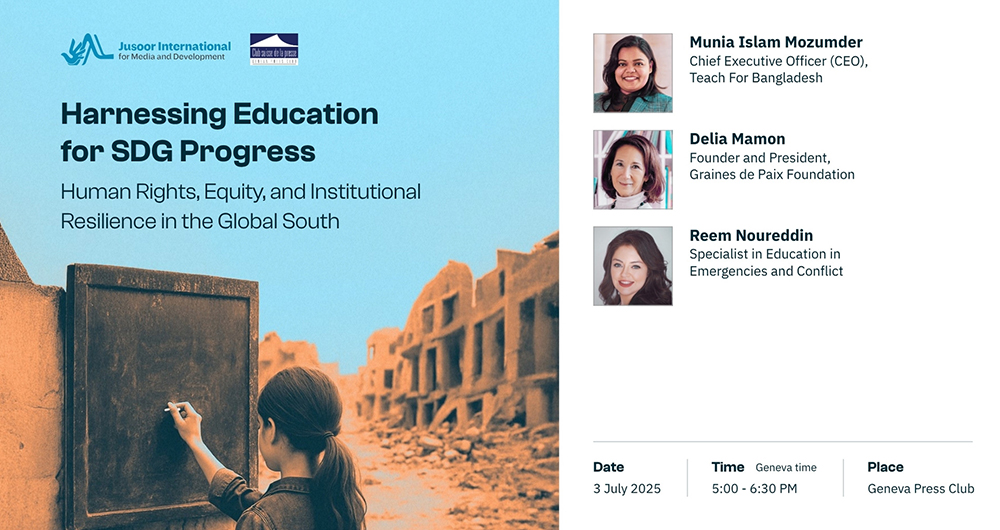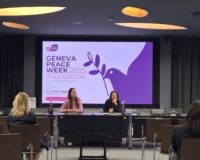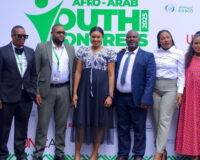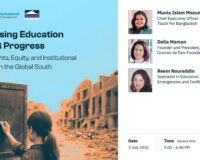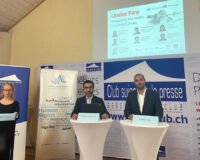On July 3, 2025, Jusoor International for Media and Development hosted a high-level panel discussion at the Geneva Press Club titled “Harnessing Education for SDG Progress: Human Rights, Equity, and Institutional Resilience in the Global South.”
This timely dialogue was held in the context of the 59th Session of the United Nations Human Rights Council, where intersecting global crises—from Gaza to climate justice—were under urgent debate. The panel contributed regionally grounded insights to broader UN-level discussions, emphasizing education as a vehicle for rights-based development and institutional resilience in the Global South.
Introducing Jusoor International for Media and Development
Founded in Geneva in 2019, Jusoor International for Media and Development is a non-governmental organization dedicated to promoting best practices in media and advancing human development globally. The organization operates at the intersection of grassroots realities and international policy spaces, collaborating with civil society actors, UN bodies, and academic platforms to craft sustainable solutions in conflict-affected and transitional contexts.
Our mission is centered on amplifying marginalized voices and fostering systemic change through advocacy, reporting, and education. Jusoor’s core programs include:
Investigating and Reporting Program – Focused on uncovering human rights violations and influencing policy through investigative media.
Emergency and Response Program – Delivering timely and data-informed humanitarian support across crisis regions.
Freedom of Expression Program – Advancing press freedom and journalist protection, particularly in zones of conflict and repression.
This panel event directly aligns with our education and development mandate, drawing attention to the transformative role of inclusive, trauma-informed, and rights-based education in advancing SDG goals and reinforcing human dignity.
Introducing the Speakers
The panel featured three globally respected voices in education and development:

Reem Noureddin is a specialist in education in emergencies and conflict. Drawing from field experience in Syria, she advocates for rights-based, trauma-informed educational approaches and intersectional curriculum reform. Her intervention underscored the emotional and structural toll of war on education, calling for post-conflict systems that resist inequality and foster justice.

Munia Islam Mozumder, CEO of Teach For Bangladesh, is a former teacher turned policy advocate who highlighted the power of youth-led civic engagement in education reform. She presented Bangladesh’s “July Uprising” as a case study in participatory leadership and argued for emotional safety as a cornerstone of educational transformation in fragile democracies.

Delia Mamon, Founder and President of the Graines de Paix Foundation, concluded the discussion with global reflections from Benin. She presented peace education as a strategic tool to heal violence-fractured societies. Her pedagogical model—recognized with the 2022 UNESCO-Hamdan award—champions experiential, values-based learning embedded within national curricula.
Introducing the Organizations
Teach For Bangladesh is a transformative education NGO committed to ending educational inequity by developing a pipeline of leaders who work to reform public education systems across Bangladesh. It combines classroom immersion with leadership training and policy advocacy.
Graines de Paix Foundation, based in Geneva, pioneers peace education programs that develop life skills and social cohesion. Their work, implemented in countries like Benin and Côte d’Ivoire, supports violence prevention and fosters empathetic learning environments through national curriculum reform.
Geneva Press Club serves as a platform for dialogue among journalists, policy experts, and international organizations. By hosting high-level events, the Club fosters public discourse and transparency on global issues, with a strong commitment to media freedom and civic dialogue.
Speaker Interventions
Munia Islam Mozumder opened the panel by sharing the evolution of educational reform in Bangladesh, shaped by youth activism and civic leadership. She emphasized the urgency of creating emotionally safe environments and the need for trauma-informed practices to ensure resilient, inclusive learning systems.
Reem Noureddin followed with a critical analysis of Syria’s educational crisis, highlighting how conflict, displacement, and gender-based exclusion have undermined the integrity of schooling. She argued for curriculum reform that centers psychosocial healing, gender equity, and resistance to marginalization.
Delia Mamon concluded by presenting case studies from Graines de Paix’s work in Benin. She demonstrated how peace education transforms not only learners but entire educational cultures. Delia emphasized that such innovations are essential in fragile contexts where traditional punitive models fail to build long-term societal cohesion.
Key Takeaways
The discussion illuminated five cross-cutting themes:
- Education as a Human Right and Peacebuilding Tool: All speakers framed education as deeply political and emotionally rooted—a mechanism for healing and transformation, not just service delivery.
- Gender and Intersectionality: Without deliberate design, education systems risk replicating structural inequalities. Intersectional approaches are crucial to equity.
- The Role of Youth: Young people must be recognized as reform leaders, especially in fragile democracies. Their lived experiences and civic energy are pivotal to system resilience.
- System-Level Reform and Curriculum Innovation: Peace-based pedagogical reforms can rewire national narratives from punitive to reflective, fostering more peaceful societies.
- Trauma-Informed Approaches: Healing the psychological scars of crisis through safe learning environments and empathetic pedagogy is a foundational strategy for meaningful reform.
Conclusion
“Harnessing Education for SDG Progress” reaffirmed education’s potential to do more than repair what conflict has broken. It can help build new, just systems—anchored in human rights, equity, and institutional resilience. The event marked a convergence of research, field experience, and moral conviction, offering actionable insights for policy actors, educators, and advocates alike.
Jusoor International and its partners hope that the insights shared will inform ongoing UN discussions and wider civil society dialogues. We invite our global community to engage with this initiative and help shape a future where education empowers communities to move beyond violence toward lasting peace.



